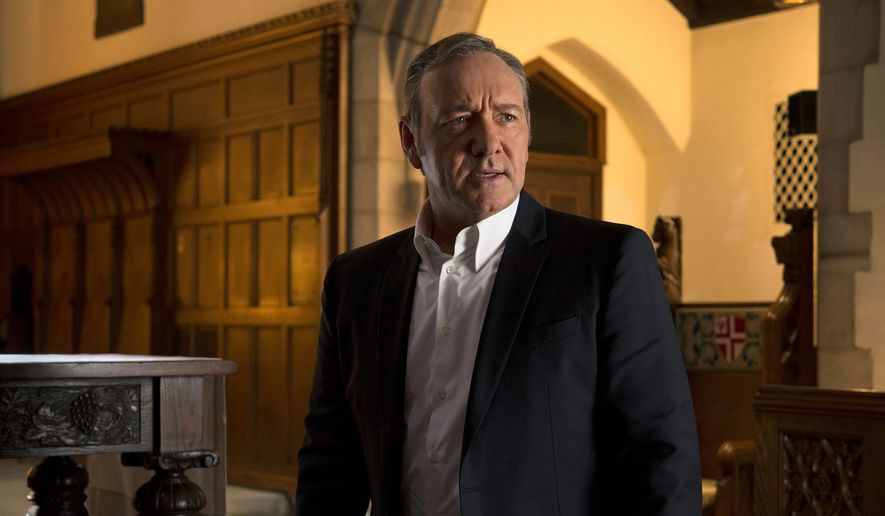Kevin Spacey has been castigated in Hollywood for coming out as gay in response to an accusation of sexual misconduct, but playing the homosexuality card in the face of scandal is nothing new in politics.
It goes back to 1983, when Rep. Gerry Studds, Massachusetts Democrat, admitted to having an affair with a 17-year-old male congressional page, a disclosure that would have been career-destroying for virtually any politician — but not Studds.
He declared he was gay — becoming the first member of Congress to do so — and argued that he had been targeted for censure over his homosexuality. The voters apparently agreed: They re-elected him six more times. A national marine sanctuary was named for him in 1996.
Other politicians who have come out only after landing in hot water include New Jersey Gov. Jim McGreevey, a Democrat, who announced at a 2004 press conference that “I am a gay American” after a former lover accused him of sexual harassment.
Two years later, Rep. Mark Foley, Florida Republican, acknowledged he was gay after he was caught sending sexually explicit texts to teenage pages.
Comedian Wanda Sykes has a term for it: She accused Mr. Spacey of trying to hide “under the rainbow” by coming out in order to divert attention from the sexual assault accusation made by actor Anthony Rapp.
“No no no no! You do not get to ’choose’ to hide under the rainbow!” Miss Sykes said Sunday in a tweet.
Mr. Rapp, 46, has accused Mr. Spacey of picking him up and lying on top of him at his Manhattan apartment in an attempt to seduce him after a party in 1986. Mr. Rapp was 14 at the time, and Mr. Spacey was about 26.
A two-time Oscar winner, Mr. Spacey issued a statement Monday saying he didn’t remember the encounter but owed Mr. Rapp “the sincerest apology for what would have been deeply inappropriate drunken behavior.”
Mr. Spacey, 58, went on to say that “I choose now to live as a gay man.” That touched off a firestorm of criticism from gay celebrities such as actor Zachary Quinto, who described it as a “calculated manipulation to deflect attention from the very serious accusation that he attempted to molest [a child].”
“Coming-out stories should not be used to deflect from allegations of sexual assault,” said Sarah Kate Ellis, president and CEO of the gay media group GLAAD. “This is not a coming-out story about Kevin Spacey, but a story of survivorship by Anthony Rapp and all those who bravely speak out against unwanted sexual advances. The media and public should not gloss over that.”
Actor and comedian Billy Eichner chimed in: “Kevin Spacey has just invented something that has never existed before: a bad time to come out.”
Others have denounced Mr. Spacey for conflating homosexuality and pedophilia in his blanket statement, perpetuating what [U.K.] Guardian columnist Owen Jones called a “vicious lie” about gay men.
“Usually when celebrities come out we’re quick to send on our congratulations and to talk about the importance of role models. But for Kevin Spacey to choose this particular moment to come out is harmful to the LGBT community,” the British gay rights group Stonewall said in a statement.
“His sexual orientation bears no relevance to the serious allegations he is facing, and to conflate these things is extremely damaging,” said Stonewall.
Mr. Spacey already has paid the price. Production on season six of his popular Netflix show “House of Cards” has been suspended while the company investigates “any concerns of our cast and crew,” according to a Tuesday statement.
Netflix and Media Rights Capital announced Monday that season six would be the last.
The International TV Academy announced Tuesday that it had withdrawn plans to honor Mr. Spacey with an International Emmy Founders Award “in light of recent events.”
Mr. Foley and Mr. McGreevey were able to avoid prosecution after being accused of sexual misconduct, but their political careers were ruined. Both resigned in disgrace before the end of their terms.
That begs the question: How did Studds, who died in 2006, manage to not only survive the scandal but thrive?
Part of it had to do with the nature of the accusations. Studds and the male page both said the relationship was consensual during the congressional ethics investigation, and the affair was not a crime given that the age of consent was 16 in the District of Columbia.
Still, the relationship was considered highly inappropriate given that members of Congress are in authority over pages. The ethics investigation also found that Studds had made sexual advances to two other teenage pages.
Studds admitted that he made a “very serious error in judgment” but was also defiant, refusing to apologize and defending the relationship as mutual.
Would a congressman who had sex with a teenage girl have survived such a scandal? There is no need to guess: On the same day that the House voted to censure Studds, it also censured Rep. Dan Crane, Illinois Republican, for having sexual relations with a 17-year-old female page.
“There was a big investigation of allegations of misconduct with pages, and they nailed one heterosexual and balanced it off with one gay member,” Studds later told OutHistory in an interview.
But Studds, who represented a liberal Cape Cod district, was given two standing ovations by constituents at a subsequent town hall. Mr. Crane, a social conservative running in a staunch Republican district, lost his re-election bid.
• Valerie Richardson can be reached at vrichardson@washingtontimes.com.




Please read our comment policy before commenting.